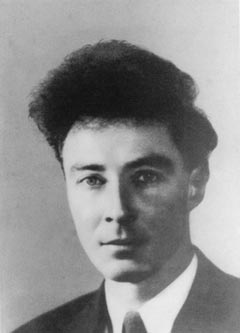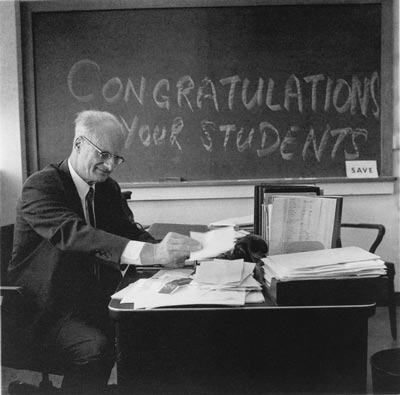
This Article From Issue
July-August 2000
Volume 88, Number 4
DOI: 10.1511/2000.29.0
In the Shadow of the Bomb: Bethe, Oppenheimer, and the Moral Responsibility of the Scientist. Silvan S. Schweber. xviii + 256 pp. Princeton University Press, 2000. $24.95.
Those who compare the making of the atomic bomb to a Faustian bargain, physicist I. I. Rabi used to say, have never read Faust. What Rabi likely meant was that those who worked to stop an evil, world-threatening dictatorship by building the first weapon of mass destruction were not scientists who sold their souls to the Devil. But there can be no question that the prestige of physicists, and that of scientists generally, was elevated by invention of the Bomb; in its aftermath, some of those who worked on the weapon would be invited to sit at power's high table in Washington.
Sam Schweber's long-awaited book on physicist Hans Bethe attempts to answer just what kind of a bargain these scientists struck, and with whom. Rather than writing a standard biography, Schweber has chosen to compare Bethe with the best known and most controversial of the atomic scientists—J. Robert Oppenheimer, the scientific director of the bomb-making project at Los Alamos. After Oppenheimer was stripped of his security clearance in 1954, Bethe would assume the mantle of the scientist of conscience in this country.

From In the Shadow of the Bomb
Although contrasting Bethe with Oppenheimer has a certain logic, there is ultimately more that unites the two than divides them, and surprisingly, the man who has been Bethe's nemesis for the past 50 years, physicist Edward Teller, receives little mention in the book. Like the ghost lurking just offstage, Teller is the invisible presence who haunts In the Shadow of the Bomb.
Schweber begins his tale by contrasting the backgrounds of Bethe and Oppenheimer. Born into privilege, Oppenheimer—"Oppie" to friends—was educated at New York City's prestigious Ethical Culture School, where the curriculum gave less weight to enduring moral precepts than to doing "the noble thing." The result, Schweber believes, was a kind of ethical relativism that left Oppenheimer with what was at best a variable moral compass. Its variability swung all the way from high-minded opposition to the hydrogen bomb in 1950 to the seemingly opportunistic—and possibly craven—sacrifice of a former graduate student, Bernard Peters, a few years later, as the hounds of the House Un-American Activities Committee (HUAC) were nipping at Oppenheimer's heels.
By contrast, in Schweber's analysis Bethe seems as constant as the polestar. Born in German-occupied Alsace just a few years before the First World War, Bethe's life became "a search for integration and integrity—for stability and unity under the conditions of growth and evolution." Schweber describes Bethe as a Bildungstraeger, one who through constant self-improvement and seeking becomes the embodiment of human reason. The German Gymnasium and a lifelong career of teaching at Cornell, where Bethe settled after fleeing Nazi Germany, gave him the ethical grounding and emotional self-confidence that Oppenheimer, for all his fiery brilliance, always lacked.

From In the Shadow of the Bomb
Like Oppenheimer, Bethe's test of character occurred when a colleague and friend, physicist Philip Morrison, came under attack for his political views. Unlike Oppenheimer in the Peters case, Bethe stood by Morrison and continued to speak out on his behalf even as the witch-hunters began to turn their attention to Morrison's defenders.
There is merit to Schweber's contrasting portraits of Oppenheimer and Bethe. (Even Rabi, Oppenheimer's friend, once observed that Oppie's tragedy was that he could never decide whether he wanted to lead the Knights of Columbus parade or head the B'nai B'rith.) But the contrast provided by the Peters and Morrison cases, while "striking," is also—as Schweber himself concedes—"somewhat unfair." There is evidence that when Oppenheimer described Peters to HUAC investigators as "dangerous" and "quite a red," he was trying to deflect attention from his own brother, Frank, a former Communist who had earlier been a target of Washington's anti-Red crusade. If so, Oppenheimer was, by his own lights, striving to do "the noble thing."
Trained as a physicist, Schweber is the first biographer to explain the significance of the scientific work that Oppenheimer and Bethe did—a fascinating topic in itself, and one that most previous biographers have tended to dismiss with so much hand-waving.
Because of his emphasis on the moral and the scientific, however, Schweber sometimes gives short shrift to or oversimplifies political events. By depicting Oppenheimer as the "insider" and Bethe as the "outsider," for example, the author glosses over the key role that Bethe played as a member of the President's Science Advisory Committee in the Eisenhower administration. Likewise, the impression is that Bethe consistently opposed the hydrogen bomb, whereas in reality his position was more complicated and nuanced: Initially opposed to development of the super-bomb for moral reasons, Bethe later returned to Los Alamos during vacations from Cornell, and following the Communist invasion of South Korea, he agreed to resume weapons work. Bethe later described himself as the H-bomb's "midwife."
Indeed, Bethe's resolution of his own moral dilemma concerning military research is emblematic of the slippery slope that a generation of atomic scientists have tried to navigate since Hiroshima, with varying degrees of success. According to Schweber, Bethe believes that while each scientist is responsible for his or her own individual actions, scientists collectively have no right to refuse to work on weapons of mass destruction. This credo would cause Bethe to first oppose and then support development of the H-bomb, to support a nuclear test ban, to oppose Ronald Reagan's "Star Wars" Strategic Defense Initiative and, most recently (and perhaps inconsistently), to call for Los Alamos scientists to "cease and desist" their work on improving nuclear weapons.
While the author's attitude toward his subject might be described as doting—Bethe gave Schweber unrestricted access to his papers for this authorized biography—In the Shadow of the Bomb escapes being hagiographical, if only because Bethe himself is so disarmingly self-critical. Ironically, the answer that Bethe would give to an interviewer seeking an explanation for the physicist's turn-about on the H-bomb could serve as an epigraph for the story of the atomic scientists: "It seemed quite logical. But sometimes I wish I were more consistent an idealist."
American Scientist Comments and Discussion
To discuss our articles or comment on them, please share them and tag American Scientist on social media platforms. Here are links to our profiles on Twitter, Facebook, and LinkedIn.
If we re-share your post, we will moderate comments/discussion following our comments policy.